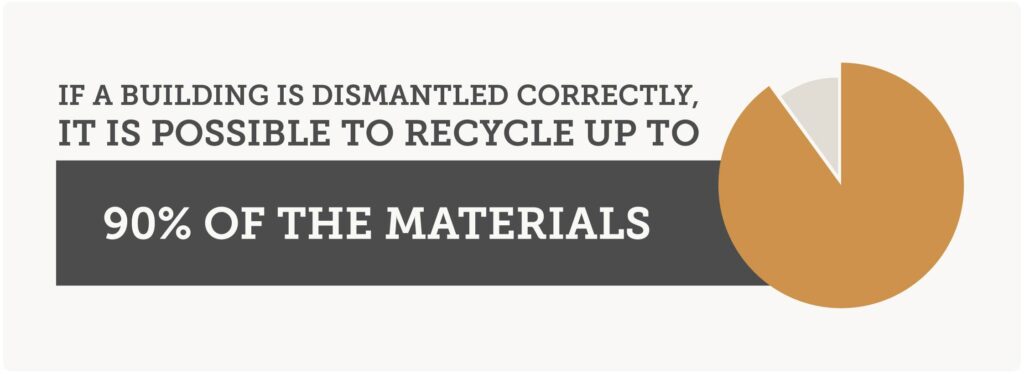Environmental stewardship focuses on protecting the natural world through conservation, sustainable practices, and pollution reduction. On a personal level, individuals can take steps to reduce waste and unnecessary consumption, lower their carbon footprint, and recycle items they no longer use.
These efforts extend to businesses as well. For example, the construction and demolition (C&D) industry plays a significant role in environmental stewardship. In their most recent study, the EPA reported that the C&D sector produces 600 million tons of debris per year. Through the process of deconstruction, many of these materials can be saved, refined, and reused in new projects.
City Ordinances Reward Environmental Stewardship in Portland’s Commercial Demolition
Some cities have taken the lead in these efforts by requiring that buildings be deconstructed. For example, a 2016 ordinance requires that certain Portland demolitions deconstruct buildings instead of mechanically tearing them down.
The rule also requires that a demolition contractor certified in deconstruction handle the project. The city does not issue permits until the owner hires such a specialist and submits a plan for deconstruction.
Here is a closer look at these efforts and how companies involved in commercial demolition in Portland are responding to the rules.
Benefits of Deconstruction in the Demolition Industry
Why does Portland push for deconstruction? It can bring exceptional results in terms of environmental stewardship.

If a building is dismantled correctly, it is possible to recycle up to 90% of the materials. Recycling the components of the building keeps them out of landfills. Reusing metals, concrete, appliances, and other assets also reduces the carbon footprint of the construction industry. Instead of manufacturing and shipping new materials, which produces a significant amount of carbon emissions, recycled assets are responsible for only a fraction of the pollution.
Also, deconstruction keeps harmful substances, such as asbestos, lead, mercury, and metals, out of the air and ground. Dust from mechanical demolition can contain these harmful elements, and they can also seep into groundwater if not handled properly.
Elder Demolition is an example of a company with experience in deconstruction, asset reclamation, and processing material for reuse in construction.
Services Merge Demolition & Environmental Stewardship
Elder Demolition provides deconstruction and recycling services to Pacific Northwest clients.
These include:
- Asset recovery. This process targets all materials and components for recycling and reuse. In addition to metals and cement, which require refining before reuse, a contractor can also collect pipes, windows, doors, appliances, machinery, and structural beams for reuse. Asset recovery can also be financially beneficial to clients, as recycling materials can offset some of the costs of a commercial demolition project.
- Scrap metal demolition. This method involves deconstructing metal structures or components in a way that prepares them for refining. The materials can be sold for reuse.
- Steel processing. This service prepares valuable metals for reuse and uses less energy than mining ore for the first time. Also, steel does not lose any of its integrity during the refining process and remains just as strong.
- Concrete crushing. Crushers reduce concrete to gravel, which contractors can reuse for a variety of purposes, including pipe and road beds, landscaping, filler, and leveling.
Contact Our Demolition Company Today
Elder Demolition’s services include deconstruction, asset reclamation, and material refining. These services put environmental stewardship within reach for developers and property owners.
If you require expert demolition in the Pacific Northwest and you would like to work with a contractor who can help you achieve environmental stewardship goals as well as save time and money, contact Elder Demolition.
